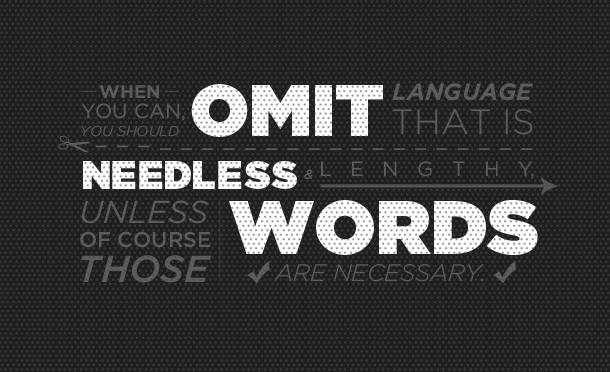Some writing is hard to read. It’s a fact of academia and common writing alike. Whether you’re sifting through Freud and attempting to make sense of his language or looking over a friend’s essay on the benefits of exercise, it’s possible you might run into some excessive description or sentence construction. I’d like to discuss two types of this over-the-top style of writing–in style and wording–and take some time to analyze when each may be valid or invalid.
The Stylistically Verbose
Every possible subject of writing uses a certain type of language, each being specific to the subdiscipline and topic. Some of this likely owes itself to progression over time–the evolution of a troped style within that discipline–however I think moreso it may be a question of utility to the genre. So, for example, the strict reliance upon passive voice in scientific writing aids the genre–which is focused upon the objective. In this way too, English, Psychology and all other academic disciplines can be seen as representing what they need to address through their language as well as content.
Let’s look at one example of excessive stylistic complexity, where the style does not match the content:
“Thomas the Tank Engine, as an agent unto himself, divided consciously somewhere between flesh and mere machine, rolled up the hill with a deep fervor as if to indicate that, he, himself, in a moment of free-wheeled independence, existed beyond the mere social convention and ideological expectation put forth by the eponymous ‘Little Engine that Could'”.
In this case, the piece’s content clearly doesn’t require the great degree of deliberation within it’s style of language–It can be stated in a much more concise way. For example, it could read “Thomas the Tank Engine was very similar to The Little Engine that Could in the moment when he went up the hill”, and lose little, in terms of content, in the process. Of course, it may not sound as elegant but because it’s not actually describing anything complex, there’s no need to make the sentence construction so complicated. So in this case, the complexity of style is wholly undeserved by both the subject matter and the action described.
This brings me to an important point I’d like to suggest–that nearly all sentences are best served by being more concise. If you can say it in three words, there’s no point in extending it to twenty. Unless you’re trying to make a satire of this very point for artistic purposes. This would be a case of purposeful contrast however, which is clearly a deliberate choice of style, as opposed to just being accidentally overly complex.
The Linguistically Verbose
Before delving into this discussion of language, I’d like you to first consider the title I’ve used above–“The Linguistically Verbose”. Now, similarly to my point about style, what I’d like to ask of you as a reader (and writer) is whether or not I could be using better words, in terms of conciseness or accuracy. Is “Linguistically” too complex? Is “Verbose”? Am I perhaps, using “verbose” to invoke some sort of implicit irony due to the subject matter? (I am). These are all good questions to ask. What I’d like to suggest is that there are two valid sides to this argument of linguistic complexity, each offering important points:
- People should be as concise as possible.
- People should try and use the level of complexity specific to what they mean.
Let’s address this second idea in terms of the title. When I say “linguistically,” what do I think of when I say it? Personally, I think of it as analytic language–a word related to the study of language, linguistics. My purpose in writing in this case is partly for analysis and partly as an informal blog piece. So because of the genre, I think it’s the right choice–my audience (college level writers and writing center workers) likely understand the word and it adheres to my intended genre. Also, were I to instead substitute the word “language” it may certainly get the point across as well in terms of content, but because my primary purpose is analysis a word that implies analysis is the better choice.
This is all well and good, but the first point–about conciseness–is something we should also consider. And the reason I think this is incredibly important is that language is a communicative act. Whenever anyone writes anything, even for themselves, at least one person in this world is supposed to see it and, ideally, have to make sense of it.
Because of this, in some ways it doesn’t matter if a writer is being as accurate to each word’s intended meaning–it might have to just be simplified for the sake of its audience. In my own experience reading, if there are one to two words in a sentence that I don’t know all that well, I’ll usually be okay. But upwards from there–three, four, five–it can seriously impede the meaning for me of the sentence.
So I think overall, there should be some combination of both in most writing–not being so blunt as to sacrifice the accuracy of the wording but not so complex as to completely ostracize the reader. And this complexity aspect relates back to the genre component as well–making sure the people for whom the writing is directed will understand what you mean.
In Conclusion
As a personal violator of several of these rules from time to time, I’d like to say that in some ways I’ve learned a little from writing this blog post. And if you’ve stuck around for the duration of this possibly arduously long post, I hope that you too can appreciate some of the ideas that I’ve found are important to consider when choosing style and language in writing.

